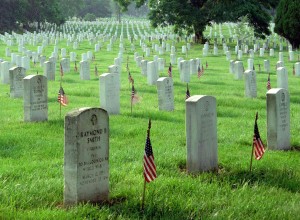 Silver jets roared west from Reagan National Airport, following the Potomac as they headed toward cities around the country. The passengers on the left would have seen a field of stones, tombs of fallen warriors now guarding Washington, D.C. for eternity. And if they were particularly eagle-eyed, they would have noticed a family walking through that field — Arlington National Cemetery. A middle-aged man and his wife pushed an older man in a wheel chair. Following along behind them was the elderly gentleman’s grandson. It was Memorial Day. And they were there to memorialize a special person.
Silver jets roared west from Reagan National Airport, following the Potomac as they headed toward cities around the country. The passengers on the left would have seen a field of stones, tombs of fallen warriors now guarding Washington, D.C. for eternity. And if they were particularly eagle-eyed, they would have noticed a family walking through that field — Arlington National Cemetery. A middle-aged man and his wife pushed an older man in a wheel chair. Following along behind them was the elderly gentleman’s grandson. It was Memorial Day. And they were there to memorialize a special person.
As they pushed through the tombs, the grandson noted some of the names on the stones: Boyington, Pershing, McCain, Chaffee, Evers, Grissom. They were names that had appeared in his history books. Men who had changed history. He also noticed many names that weren’t so familiar. War and fate had struck them down before history had had a chance to record their names in some text book. The boy wondered if the person who might have cured cancer was lying in this field.
War’s scythe harvests what might have been.
The grandfather looked out at the stones. He knew the cost of war first hand. In 1967, he had flown over Vietnam in his Navy A-4 Skyhawk. It had been fairly routine flight until a SAM exploded just behind his plane. Shrapnel tore his right wing and his plane went into a death spiral. He began to blackout right has his hand pulled the the ejection lever. An explosion, violence and then silence.
His plane had been shot down, causing his life to change forever.
As he landed in the rice paddy, he felt a sharp jolt and intense pain — his back was broken. He remembered that pain until the moment he was beaten unconscious by angry villagers. A few days later, he woke up in a body cast in a filthy prison and rotted for seven years until diplomats unlocked his personal hell’s door. He rolled off the C-141 to daylight and freedom. Well, not total freedom. The nightmares still haunted him to this day.
His younger brother Pete decided flying was for sissies and joined the Marines. He remembered getting Pete’s letters while on the aircraft carrier. “If you ever man-up and come to Vietnam, I’ll buy the first round of beers,” his little brother joked.
His brother never bought him that beer.
The finally reached their destination. Three graves down, the grandfathers’ wheelchair stopped in front of the tomb he was looking for. “Pete, this is for you.” He pulled three beers and a ginger ale out of a small cooler in his chair. All four of them raised their cans into the blue May air as the the old man gave a toast.
“To the greatest brother a man could have ever asked for. Thank you for sacrificing what could have been for what is. I know you could have been anything you wanted to be. But you chose to serve. I respect your honor and I miss you. Here’s that beer you owed me.”
He then pushed himself up out of his chair and fell down on the ground next to the stone. He wept openly for a the brother he had missed so many years.
Another jet took off from Reagan National Airport. They passengers on the left side would have noticed an old man lying on his brother’s grave.
The grandson looked around and realized each stone had a story just like his great uncle Pete’s. Memorial Day was a day to honor the sacrifices they made and to mourn the loss of what could have been. He drank his ginger ale in honor of a great man — a man he would never know. And who he was named for.
War’s scythe had harvested what might have been.
